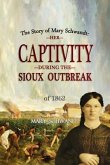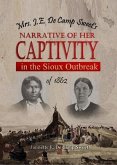"Resilience and physical stamina enabled her to escape, Tarble is woman as victor." -The War in Words (2009)
"Captivity apparently awakens Tarble's powers of dissent." -Bound and Determined (1996)
"Helen Tarble and Minnie Carrigan were both captured by Indians during the Sioux outbreak, both wrote about their fears of death before they were finally rescued." -Westering Women and the Frontier Experience (1982)
The stories of those pioneers who have survived captivity among tribes during hostile outbreaks along frontier settlements are full of harrowing interest. Of particular interest is that told by Helen M. Tarble in her 1904 narrative, "The Story of My Capture and Escape During the Minnesota Indian Massacre of 1862."
In August 1862, the Sioux of the Minnesota plains went on the warpath against white pioneers in the Dakota War or Sioux Outbreak of 1862. A young Caucasian pioneer woman Helen M. Tarble (1843-1921) and her children were captured.
Upon news in August of 1862 of that the Sioux uprising had begun, the alarm soon spread throughout the settlement Tarble lived in, and it was decided that all should flee at once to Fort Ridgely. After fleeing a short distance in a horse-drawn wagon, Tarble relates:
"We had not gone more than half a mile when, to our horror, a considerable number of Indians-perhaps 75 in all-rose up out of the tall prairie grass and surrounded us. ... Looking back I saw the whole band we had left coming after us, and heard the reports of three guns. The dreadful truth flashed upon me; the Indians were killing us! Several bullets struck the wagon...."
Tarble relates that after her capture and during her ensuing captivity "they put me at work and found plenty of it to do. I chopped wood, brought water, gathered corn from the fields and fed the horses, and all the time I was closely watched and never allowed to go alone, a squaw always keeping at my side. Finally serious trouble threatened me. A squaw told me there was a great fuss among the Indians on my account. She said four braves claimed me, each for himself..."
In describing the moment of her escape from cruel captivity during a storm, Tarble writes:
"Then I resolved to make an effort to escape. I could but die trying. It was a forlorn hope, a desperate chance, for the Indians were encamped on both sides of the field and the growing corn did not reach above my head. But it was certain death to remain, and so I got down on my hands and knees, with the two children clinging to my back, and crawled away, making very good time under the circumstances. I soon heard the Indians in pursuit...
In this remarkable true story of escape and survival against all odds, Tarble, after surviving cruelties and atrocities at the hands of her captors, upon escape would face a harrowing flight of 60 miles with no food before she could reach the relative safe haven of Fort Ridgely.
"Captivity apparently awakens Tarble's powers of dissent." -Bound and Determined (1996)
"Helen Tarble and Minnie Carrigan were both captured by Indians during the Sioux outbreak, both wrote about their fears of death before they were finally rescued." -Westering Women and the Frontier Experience (1982)
The stories of those pioneers who have survived captivity among tribes during hostile outbreaks along frontier settlements are full of harrowing interest. Of particular interest is that told by Helen M. Tarble in her 1904 narrative, "The Story of My Capture and Escape During the Minnesota Indian Massacre of 1862."
In August 1862, the Sioux of the Minnesota plains went on the warpath against white pioneers in the Dakota War or Sioux Outbreak of 1862. A young Caucasian pioneer woman Helen M. Tarble (1843-1921) and her children were captured.
Upon news in August of 1862 of that the Sioux uprising had begun, the alarm soon spread throughout the settlement Tarble lived in, and it was decided that all should flee at once to Fort Ridgely. After fleeing a short distance in a horse-drawn wagon, Tarble relates:
"We had not gone more than half a mile when, to our horror, a considerable number of Indians-perhaps 75 in all-rose up out of the tall prairie grass and surrounded us. ... Looking back I saw the whole band we had left coming after us, and heard the reports of three guns. The dreadful truth flashed upon me; the Indians were killing us! Several bullets struck the wagon...."
Tarble relates that after her capture and during her ensuing captivity "they put me at work and found plenty of it to do. I chopped wood, brought water, gathered corn from the fields and fed the horses, and all the time I was closely watched and never allowed to go alone, a squaw always keeping at my side. Finally serious trouble threatened me. A squaw told me there was a great fuss among the Indians on my account. She said four braves claimed me, each for himself..."
In describing the moment of her escape from cruel captivity during a storm, Tarble writes:
"Then I resolved to make an effort to escape. I could but die trying. It was a forlorn hope, a desperate chance, for the Indians were encamped on both sides of the field and the growing corn did not reach above my head. But it was certain death to remain, and so I got down on my hands and knees, with the two children clinging to my back, and crawled away, making very good time under the circumstances. I soon heard the Indians in pursuit...
In this remarkable true story of escape and survival against all odds, Tarble, after surviving cruelties and atrocities at the hands of her captors, upon escape would face a harrowing flight of 60 miles with no food before she could reach the relative safe haven of Fort Ridgely.
Dieser Download kann aus rechtlichen Gründen nur mit Rechnungsadresse in A, D ausgeliefert werden.









